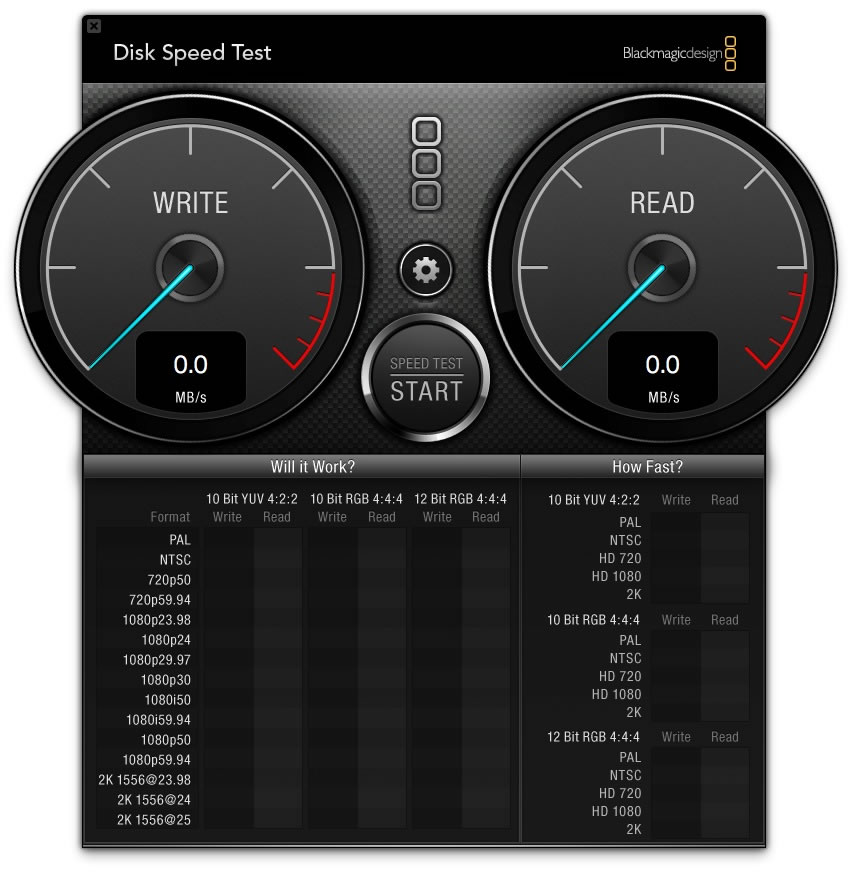
- #UNDERSTANDING BLACKMAGIC DISK SPEED TEST RESULTS HOW TO#
- #UNDERSTANDING BLACKMAGIC DISK SPEED TEST RESULTS DOWNLOAD#
- #UNDERSTANDING BLACKMAGIC DISK SPEED TEST RESULTS MAC#
I could go into a lot of detail regarding Geekbench’s results, and there are a lot of them, sorted into three main categories, each with multiple tests.
#UNDERSTANDING BLACKMAGIC DISK SPEED TEST RESULTS MAC#
There’s only one hitch: the only runs older (“32-bit”) benchmarks on your Mac to see the superior performance you’d get from newer (“64-bit”) apps, you’ll need the. If you have only one hard drive, you can just hit the Start button after you’ve quit all of your other apps otherwise, you can access settings by pressing the gear button between the two speedometer circles, or use the File and Stress menus at the top of the screen.
#UNDERSTANDING BLACKMAGIC DISK SPEED TEST RESULTS DOWNLOAD#
Completely free to download from the Mac App Store, this app has only a single window and very few settings to worry about. Below, I’ll introduce three of the best free Mac benchmarking tools, and explain how they work For Hard Drive Speeds: BlackMagic Disk Speed Test Measuring the speed of your hard drive is the easiest benchmarking process around, and the best tool I’ve found for that task is the. Many apps help you measure the speed of various components of your Mac, and with a little help, you can estimate the performance jumps you’ll see after an upgrade. But there’s a common question that comes up when considering upgrades: how can you tell in advance how big of an improvement you’ll actually see? The answer: benchmarking tools. I want to get the real time results in one file so I can dump it into Excel and have my way with it.Over the course of writing guides to boosting Mac and hard drive speeds, I’ve discussed the incredible performance improvements Macs can get from simple upgrades -, choosing a or, and even. Once it's capturing the results I can fiddle with formatting.
#UNDERSTANDING BLACKMAGIC DISK SPEED TEST RESULTS HOW TO#
Instead the time results just output to the screen and the script continues:Īny thoughts about how to collect that time output into the file? Really all I need is the "real" time portion of the output. I used "touch" to create the output file and set the permissions so that I *should* be able to write the "time" command's results to it. The counter works, the copy works, echo works, but the output doesn't work. The counter is set to 3 right now for troubleshooting. It's just supposed to be a copy OneGBFile from one location to another and output the time to the file "IQResults_SmallFile.txt" 50 times echoing the count to the screen so I can track progress.

Time cp /Users/chris/Documents/IQ_Project/OneGBFile /Volumes/DISK_IMG > /Users/chris/Documents/IQ_Project/IQResults_SmallFile.txt I know we first dipped into this question two months ago but I was hoping that you might be willing to help me troubleshoot the script I wrote: I can write it up for you when I am at a computer again (on my phone). Get the Unix epoch time, initiate the transfer, get the time again, subtract, and output to a file, nicely formatted as mm:ss. This is probably something you could Bash script. I have no problem copying the file 50 times x n flash drives as long as I can get an accurate copy time, or at least a set of copy times that are accurate relative to each other. I just wanted to see if I could find a program that would eliminate ME from running the timer.

All I wanted to do was track how long it took to copy a large file (20GBish) to a flash drive since that's what we primarily use them for, backing up work we've done on the school's computers. I thought this would be a relatively cheap experiment. I'm told that, in the past, people have done things like test the life of various brands of batteries or the driving distance of a selection of golf clubs from different manufacturers. The point of the exercise is to use the scientific method to solve a problem.
:max_bytes(150000):strip_icc()/2SelectTargetDriveannotated-911e010dbe2146c785f18dbfcdb47732.jpg)

You can counteract batch effect by either running 50xhowever many USB drives you have tests all at the same time, or you can use statistical tools (like the R package ComBat or sva) to correct it. What type of class is this? That is, is it a general exercise to develop an understanding of the scientific method, or is it a computer science/programming assignment? If the former, you are going to run into something called batch effect if you try to do this manually (essentially every time you sit down to do a run of tests will bias the results subtly from the last time you sat down to do a run, so each "batch" of tests will be "offset" by roughly the same amount), so automating it (to some extent) would actually be a good thing that I would want to justify to my teacher.


 0 kommentar(er)
0 kommentar(er)
